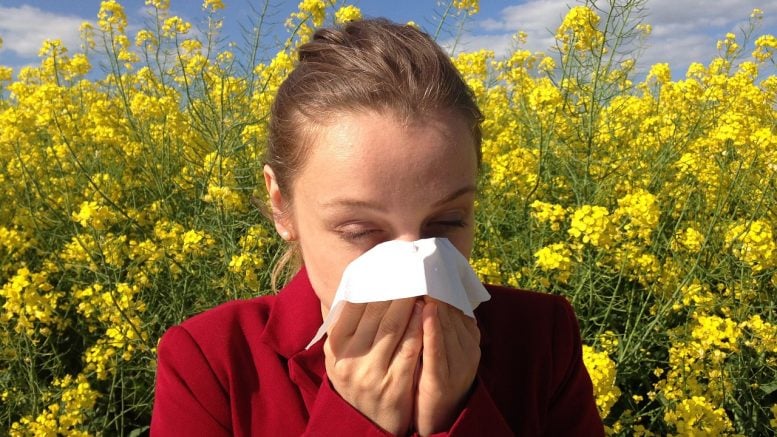Whether you have seasonal or perennial allergic rhinitis, dealing with the usual symptoms of this condition can be tiring and frustrating. Frequent sneezing and an itchy, runny, or stuffy nose can be annoying and bothersome. Having itchy and watery eyes will make it hard for you to concentrate and go about your work as well.
Allergic rhinitis or hay fever also comes with other possibly debilitating symptoms similar tovarious kinds of of allergies. These include:
- Cough due to postnasal drip
- Pressure in the nose and cheeks
- Nosebleeds
- Headaches
- Earaches and popping
- Dizziness
- Nausea
Minimizing Hay Fever Symptoms
Even if you have allergic rhinitis all year round, it doesn’t mean you have to suffer through all the uncomfortable and unbearable symptoms of this condition. There are several easy, practical tips you can follow to minimize and manage the symptoms of hay fever.
Here are some of them:
1. Minimize exposure to pollen.
Pollen is the most common and prevalent allergic rhinitis trigger. But since pollen is all around, especially during spring and summer, avoiding it is next to impossible. Minimizing your exposure to pollen, however, can be done.
Start by regularly checking the pollen counts in the place where you live. There are various websites that provide a pollen index by country and city or state. If the pollen count in your area is high, avoid going outdoors, if possible.
In case you have to go out, try to do so directly after an afternoon rain shower since the rain will have washed the pollen out of the air. Smear a small amount of petroleum jelly inside each nostril to prevent pollen from irritating your nose. Wear a face mask and wrap-around sunglasses for additional protection as well.
Lastly, avoid hanging your clothes, pillowcases, and bedding outside to dry when a high pollen count is predicted.
2. Avoid pets if possible.
Aside from pollen, pet dander is another top allergic trigger. If you have perennial rhinitis, you would do well not to keep any pets at all.
If this is not possible, keep them away from the areas and rooms you spend a lot of time in such as the bedroom and kitchen. In addition, make sure your pets are washed regularly.
3. Maintain a clean home
Pollen, pet dander, and dust mites will still find their way in your home even if you try your best to avoid bringing them in. To reduce your exposure to these allergens, clean and declutter your home regularly.
Start by vacuuming and dusting your home frequently. If your carpets, rugs, and wall coverings are already old, consider removing or replacing them. Reduce clutter such as books, magazines, and other decorative items that only collect dust.
In case your home is susceptible to molds and mildew, use bleach and scrub the walls, shower area, and other humid household areas that are often wet. Additionally, always keep these areas well-ventilated to minimize mold and mildew growth.
In addition, improve the air quality inside your home by installing air filters in your cooling and heating systems. These additional fixtures can remove about 95 percent of allergen particles from indoor air.
4. Practice good personal hygiene.
If you have just been outdoors, avoid tracking in pollen to your bedroom by taking a shower and changing your clothes before entering this room. Put your soiled clothes in the laundry basket immediately as well.
Additionally, wash your face and hands frequently to remove pollen that may have settled around your eyes and nose.
If you are fond of facial steams, try doing these more often. The facial steam will not only do wonders for your skin, but will also help clear up your nose congestion.
5. Change your lifestyle.
Finally, to minimize and manage hay fever symptoms effectively, reassess your diet.
Having a strong immune system is crucial in preventing hay fever. As such, eat more fresh fruits and vegetables, lean proteins, and healthy fat sources like tuna, salmon, and nuts to boost your immune system.
Exercising regularly will also help improve your immune system. Try to get at least 30 minutes of indoor workouts every day since running, walking, or hiking outdoors may aggravate the symptoms.
Additionally, reduce your intake of alcohol. Alcohol can be dehydrating and could worsen your hay fever symptoms. Drink more water and herbal teas instead.
Lastly, stop smoking or using tobacco products, or use them less frequently. This is because tobacco can irritate your respiratory passages and nose, and can thus worsen the symptoms.
As a final tip, always keep a supply of the top-rated allergy medication at home. Take your medicine as prescribed by your doctor so that you can manage your hay fever symptoms as soon as possible.
Guest author: Stephen Johnson





Be the first to comment on "5 Practical Ways to Manage Your Hay Fever Symptoms"